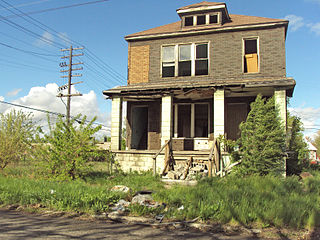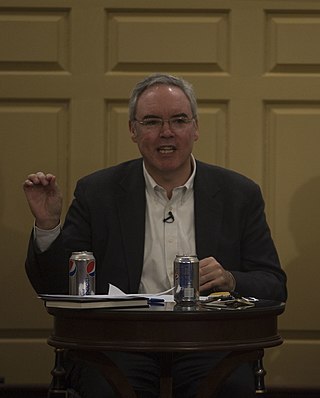Related Research Articles

Detroit is the most populous city in the U.S. state of Michigan. It is the largest U.S. city on the United States–Canada border, and the seat of government of Wayne County. Detroit had a population of 639,111 at the 2020 census, making it the 29th-most populous city in the United States. The Metro Detroit area, home to 4.3 million people, is the second-largest in the Midwest after the Chicago metropolitan area and the 14th-largest in the United States. A significant cultural center, Detroit is known for its contributions to music, art, architecture and design, in addition to its historical automotive background.

Wayne State University is a public research university in Detroit, Michigan. It is Michigan's third-largest university. Founded in 1868, Wayne State consists of 13 schools and colleges offering approximately 350 programs to nearly 24,000 graduate and undergraduate students. Wayne State University, along with the University of Michigan and Michigan State University, compose the University Research Corridor of Michigan. Wayne State is classified among "R1: Doctoral Universities – Very high research activity".
Latin honors are a system of Latin phrases used in some colleges and universities to indicate the level of distinction with which an academic degree has been earned. The system is primarily used in the United States. It is also used in some Southeastern Asian countries with European colonial history, such as Indonesia and the Philippines, and African countries such as Zambia and South Africa, although sometimes translations of these phrases are used instead of the Latin originals. The honors distinction should not be confused with the honors degrees offered in some countries, or with honorary degrees.

Detroit, the largest city in the state of Michigan, was settled in 1701 by French colonists. It is the first European settlement above tidewater in North America. Founded as a New France fur trading post, it began to expand during the 19th century with U.S. settlement around the Great Lakes. By 1920, based on the booming auto industry and immigration, it became a world-class industrial powerhouse and the fourth-largest city in the United States. It held that standing through the mid-20th century.
A dean's list is an academic award, or distinction, used to recognize the highest level scholarship demonstrated by students in a college or university. This system is most often used in North America, though institutions in Europe, Asia, and Australia may also employ similar measures. It is often synonymous with honor roll and honor list, but should not be confused with honours degrees.

The Scunthorpe problem is the unintentional blocking of online content by a spam filter or search engine because their text contains a string of letters that appear to have an obscene or otherwise unacceptable meaning. Names, abbreviations, and technical terms are most often cited as being affected by the issue.
Galster is a family tree surname. People with that name include:

Shrinking cities or urban depopulation are dense cities that have experienced a notable population loss. Emigration is a common reason for city shrinkage. Since the infrastructure of such cities was built to support a larger population, its maintenance can become a serious concern. A related phenomenon is counterurbanization.

Thomas J. Sugrue is an American historian of the 20th-century United States currently serving as a professor at New York University. From 1991 to 2015, he was the David Boies Professor of History and Sociology at the University of Pennsylvania and founding director of the Penn Social Science and Policy Forum. His areas of expertise include American urban history, American political history, housing and the history of race relations. He has published extensively on the history of liberalism and conservatism, on housing and real estate, on poverty and public policy, on civil rights, and on the history of affirmative action.
David Neumark is an American economist and a Chancellor's Professor of Economics at the University of California, Irvine, where he also directs the Economic Self-Sufficiency Policy Research Institute.

In the United States, subsidized housing is administered by federal, state and local agencies to provide subsidized rental assistance for low-income households. Public housing is priced much below the market rate, allowing people to live in more convenient locations rather than move away from the city in search of lower rents. In most federally-funded rental assistance programs, the tenants' monthly rent is set at 30% of their household income. Now increasingly provided in a variety of settings and formats, originally public housing in the U.S. consisted primarily of one or more concentrated blocks of low-rise and/or high-rise apartment buildings. These complexes are operated by state and local housing authorities which are authorized and funded by the United States Department of Housing and Urban Development (HUD). In 2020, there were one million public housing units. In 2022, about 5.2 million American households that received some form of federal rental assistance.

Steven G. Horwitz was an American economist of the Austrian School. Horwitz was the Distinguished Professor of Free Enterprise in the department of economics in the Miller College of Business at Ball State University in Muncie, Indiana. In 2017, he retired as the Dana Professor of Economics Emeritus at St. Lawrence University.
Michael Roland Powers is an American academic who is the Chair Professor of Finance at Tsinghua University’s School of Economics and Management (SEM) in China. Since 2014, he has held a dual appointment as professor at Tsinghua's Schwarzman College. An internationally recognized risk and insurance expert, he was a 2011 recipient of China’s Thousand Talents Plan award. In 2013, he won the Kulp-Wright Book Award for Acts of God and Man: Ruminations on Risk and Insurance.
Harry Joseph Holzer is an American economist, educator and public policy analyst.
Housing discrimination in the United States refers to the historical and current barriers, policies, and biases that prevent equitable access to housing. Housing discrimination became more pronounced after the abolition of slavery in 1865, typically as part of Jim Crow laws that enforced racial segregation. The federal government didn't begin to take action against these laws until 1917, when the Supreme Court struck down ordinances prohibiting blacks from occupying or owning buildings in majority-white neighborhoods in Buchanan v. Warley. However, the federal government as well as local governments continued to be directly responsible for housing discrimination through redlining and race-restricted covenants until the Civil Rights Act of 1968.
Hunter L. Hunt is an American heir and businessman. He serves as the chairman and chief executive officer of Hunt Consolidated Energy.

Black Detroiters are black or African American residents of Detroit. According to the U.S. Census Bureau, Black or African Americans living in Detroit accounted for 79.1% of the total population, or approximately 532,425 people as of 2017 estimates. According to the 2000 U.S. Census, of all U.S. cities with 100,000 or more people, Detroit had the second-highest percentage of Black people.

The Manhattan Institute for Policy Research is an American conservative think tank focused on domestic policy and urban affairs. The institute's focus covers a wide variety of issues including healthcare, higher education, public housing, prisoner reentry, and policing. It was established in Manhattan in 1978 by Antony Fisher and William J. Casey.

Matthew Desmond is a sociologist and the Maurice P. During Professor of Sociology at Princeton University, where he is also the principal investigator of the Eviction Lab. Desmond was elected to the American Philosophical Society in 2022.

Dr. Rosa Slade Gragg was an American activist and politician. She founded the first black vocational school in Detroit, Michigan; and was the advisor to three United States presidents. She was inducted in 1987 into the Michigan Women's Hall of Fame.
References
- 1 2 "George Galster Curriculum Vitae" (PDF). Retrieved 19 July 2016.
- ↑ Cleeland, Nancy (23 July 2006). "L.A. Area Going to Extremes as the Middle Class Shrinks". The Los Angeles Times. Retrieved 19 July 2016.
- ↑ "George Galster". Wayne State University. Retrieved 19 July 2016.
- Boger, John Charles (1996). Race, Poverty, and American Cities. University of North Carolina Press. p. 33. ISBN 9780807845783. - ↑ Chakraborty, Barnini (2 August 2014). "Riding the rails: Millions at stake for Detroit's taxpayer-backed transit experiment". Fox News. Retrieved 19 July 2016.
- ↑ Hackman, Rose (28 September 2014). "Detroit demolishes its ruins: 'The capitalists will take care of the rest'". The Guardian. Retrieved 19 July 2016.